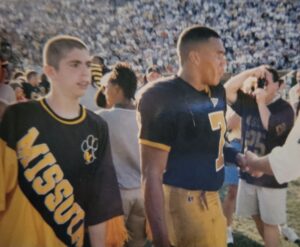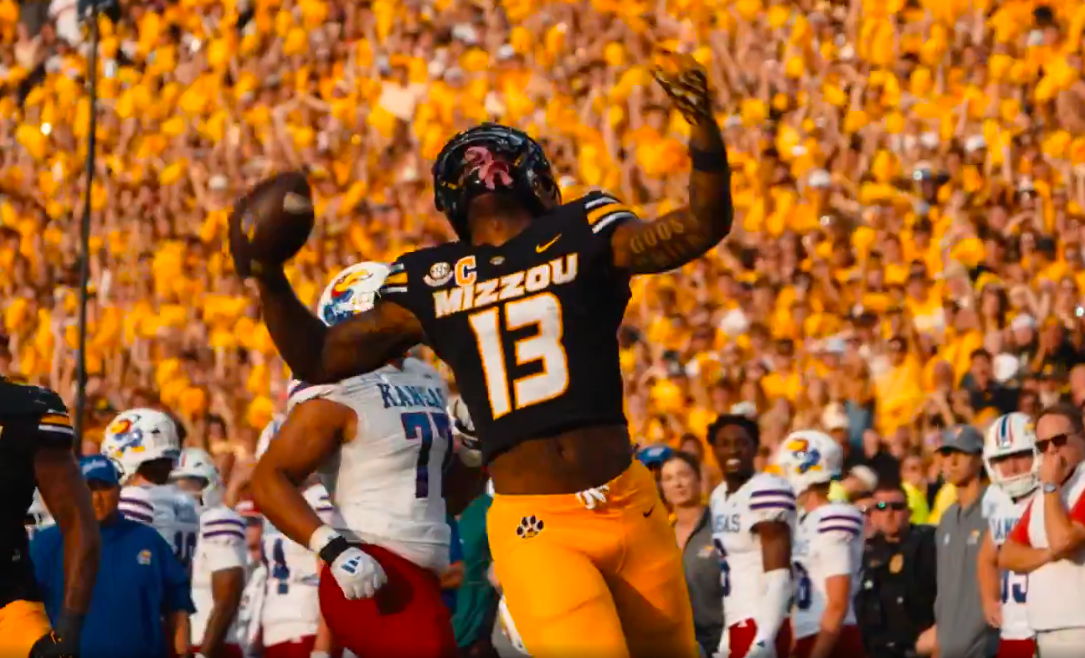The sun hung bright and heavy over Columbia on Saturday, the kind of late-summer sky that makes everything below it feel sharper, louder, more alive. Inside a sold-out Memorial Stadium, a sold-out crowd gathered for something that hadn’t happened in 14 years: Missouri vs. Kansas on the football field.
For some, it was simply a date on the schedule. For me, it was a pilgrimage.
I grew up in small-town Missouri, where hating Kansas was less a choice and more a rite of passage. My dad hated Kansas. My grandpa hated Kansas. The Jayhawks weren’t just a rival; they were the villain in every story. Were they truly bad people, intent on wreaking havoc on society? If you asked my family, the answer was obvious: absolutely. But the truth is simpler — and maybe more fun. Rivalries aren’t rational. They’re about geography, tradition, and the thrill of defining yourself by who you aren’t. Kansas was crimson and blue. We were black and gold. And that was enough.

That tension, that passion, that unshakable divide — it was all back on Saturday.
I got to Columbia much earlier than usual. I wanted to feel the day, not just report it. On campus, fathers held their sons’ hands as they walked toward the stadium, pointing at banners and explaining why this game mattered. Students, buzzing with the kind of nervous energy only a rivalry can produce, were already filing into the stands hours before kickoff. By the time the teams took the field, the air felt thick with memory, history, and anticipation.
And then came the game.
Kansas came to fight, and in a big way. By the end of the first quarter, the Jayhawks led 21-6, unfazed by the stadium-wide chorus of Mr. Brightside and its defiant conclusion of “Beat KU”…or something like that. For a moment, the sellout crowd sat uneasy. But Missouri never flinched.
Quarterback Beau Pribula put on a clinic. Calm, efficient, and relentless, he completed 30 of 39 passes for 343 yards and three touchdowns. The Tigers’ running game, meanwhile, slowly wore down the Jayhawks like water against stone. Ahmad Hardy rushed for 112 yards and a score. Jamal Roberts added 143 more, including the game-sealing touchdown that sent Memorial Stadium into a frenzy.
By the numbers, the dominance was staggering: 595 total yards to 254, a 40-minute to 20-minute edge in time of possession. A first-quarter mistake spotted Kansas a touchdown, but it hardly mattered. As the final seconds ticked away, Missouri emerged with a 42-31 victory — and a statement that the Border War wasn’t just back. It was alive.
What happened next was as memorable as the game itself. Former Tiger legends like Jeremy Maclin, Sean Weatherspoon, and Tony Temple joined the celebration on the field, embracing the current generation. Wideout Marquis Johnson slammed the famed “Border War” drum right in the face of the Jayhawk mascot, a moment both theatrical and perfectly fitting for a rivalry that thrives on spectacle.
“I think our fans really showed up and showed out. This is the expectation moving forward, it’s not just about beating Kansas, it’s about being like this all the time in SEC play.”
It all felt bigger than football. Because in truth, this rivalry always has been. It dates back to 1911 on the gridiron, and much further back in the annals of American history — to border skirmishes and Civil War battlefields. For more than a decade, it disappeared, lost in conference realignment and modern college football politics. A generation of kids grew up without it, without knowing the way this game can turn an ordinary Saturday into something unforgettable.
But now, it’s back.
And as I walked out of the stadium, past the echoes of chants and the scattered remnants of a day no one in Columbia will soon forget, I couldn’t help but smile. Rivalries like this don’t just connect us to our teams. They connect us to our families, our histories, our identities.
For me, Saturday wasn’t just about Missouri beating Kansas. It was about remembering why I fell in love with sports in the first place. It sure wasn’t because of NIL deals and transfer portals.
The Border War has returned. And it feels like coming home.

